NCERT English Workbook Class 9 Solutions Unit 1 Verb Forms are part of English Workbook Class 9 Solutions . Here we have given CBSE Class 9 English Workbook Solutions Unit 1 Verb Forms.
CBSE Class 9 English Workbook Solutions Unit 1 Verb Forms
Question 1.
Simple past and past perfect
Complete this story by Julius Lester. Choose the correct forms of the words given in the brackets.
Brer Rabbit (a) ________ (decidedI had decided) gardening was too much hard work. So he (b) ________ (had gone/went) back to his old ways of eating from everybody else’s garden. Earlier, he (c)________ (made/had made) a tour through the community to see what everybody (d)________ (had been/was) planting that summer and his eye (e) ________ (was/had been) caught by Brer Fox’s peanut patch.
Soon as the peanuts (f) ________ (had been/were) ready, Brer Rabbit (g) ________ (decided/had decided) to make his acquaintance with them. Every night he (h) ________ (had eaten/ate) his fill and even started bringing his family. Brer Fox (i) _______ (had/had had) a good idea who was eating his peanuts, but he couldn’t catch him. He inspected his fence and finally (j) ________ (had found/found) a small hole on the north side. He tied a rope with a loop knot and put it inside the hole. If anybody (k) ________ (stepped/had stepped) in it, the rope would grab his leg and hoist him up in the air.
That night Brer Rabbit (l) _______ (came/had come) down to the peanut patch. He climbed through the hole and WHOOSH ! Next thing he (m) _______ (had known/knew), he was hanging in the air upside down. There (n) ________ (wasn’t/hadn’t been) a thing he could do, so he made himself comfortable to catch a little sleep!
Answers:
(a) had decided
(b) went
(c) had made
(d) had been
(e) had been
(f) were
(g) decided
(h) ate
(i) had had
(j) found
(k) stepped
(l) came
(m) knew
(n) wasn’t
Question 1.1
Answer the following questions based on the story you have read.
(a) What had Brer Rabbit found out?
(b) What did he do when the plants grew?
(c) How did he enter Brer Fox’s peanut patch?
(d) Brer Fox had an idea of who was stealing from his patch. What did he do to trap Brer Rabbit?
Answers:
(a) Brer Rabbit had found out that gardening was too much hard work.
(b) He ate peanuts to his fill.
(c) He entered Brer Fox’s peanut patch through a small hole in the fence.
(d) Brer Fox inspected his fence and found a small hole on the north side. He tied a rope with a loop knot and put it inside the hole. If anybody stepped into it, the rope would grab his leg and hoist him up in the air.
You must have used the simple past tense and past perfect tense in your answer. Do you know most often, when you use the past perfect, you use it with the (simple) past?
Study the sentences from the story and write whether (a) the action happened before the action mentioned in the simple past tense, or (b) an action happened after the action mentioned in the past perfect tense.
(eg.) Brer Rabbit had decided ________ (a) ________ gardening was ________ (b) ________ too much for him. So, he went back to his old ways. Earlier, he had made ________ a tour through the community to see what everybody had been ________ planting that summer and his eye was ________ caught by Brer Fox’s peanut patch.
Answers:
(a) decided / had decided This action takes place before the one given in (b) here.
(b) had gone / went — do —
(c) made / had made This action takes place before those given in (a), (b) above.
(d) had been / was — do —
(e) was / had been — do —
(f) had been / were Action in (f) takes place before the action in (g).
(g) decided / had decided — do —
(h) had eaten / ate This action takes place after the actions shown in (f) and (g) above.
(i) had / had had Action shown in (i) takes place before the action in (j)
(j) had found / found — do —
(k) stepped / had stepped The action shown in (k) takes place after the action given in (i) and (j).
(l) came / had come This action takes place after those given under (i), (j) and (k).
(m) had known / knew This action takes place after the actions under (k) and (l).
(n) wasn’t / hadn’t been This action also takes place after those given above.
Note: Usually the action shown in Past Perfect Tense occurs before the action shown in Simple Past Tense occurs.
Question 2.
Here is a news story about how crops are saved by climate-proofing them. Complete it by choosing the right words from those given in the brackets.
Among the most worrying aspects of climate change today (a) __________ (is/has been) the effect it (b) __________ (has had/have had) on the food supply of the world. Sctentists (c) __________ (have focussed /focus) their attention and efforts on increasing crop yield and improving crop resilience. Asia and Sub-Saharan Africa (d) __________ (have been I are) the most affected today. Their population (e) __________ (is/has been) the world’s fastest growing rice consumer. The most vulnerable agricultural systems (f) __________ (are/have been) the rain-fed uplands and lowlands that form 80% of total rice land. Until recently, scientists (g) __________ (have focussed / focussed) on improving crop yields, and in a relatively short period of time, (h) __________ (give / have given) us, higher yields. Reports warning of increased droughts and floods, (i) __________ (shift/have shifted) scientists’ attention to making crops “climate- proof”
Answers:
(a) is
(b) has had
(c) have focussed
(d) are
(e) has been
(f) are
(g) have focussed
(h) have given
(i) have shifted
Question 2.1
Answer the questions based on your reading of the passage above.
(a) What have been the most worrying aspects of agricultural growth?
(b) What do scientists today focus on?
(c) Where is the negative impact of climate most felt?
(d) What have the scientists focussed on so far?
(e) How has their attention shifted?
Answers:
(a) The most worrying aspects of agricultural growth have been the effects on the food supply of the world.
(b) Scientists today focus on their efforts to increase the crop yield.
(c) The negative impact of climate most felt has been on the agricultural systems of the rain-fed uplands and lowlands (in Asia and Sub-Saharan Africa).
(d) The scientists have so far focussed on improving crop yields.
(e) Their attention has shifted to make crops ‘climate-proof.
Did you know
You would have used the simple present and present perfect tense in your answer. Why?
The main use of the simple present tense is to refer to
- an action that takes place now.
- routine action/s.
The present perfect tense is used to refer to an action which has happened in the past but whose effect still remains.
(eg.) Among the most worrying aspect of climate change is the effect it has on the world’s food supply.
Climate scientists have predicted that the cultivation of rice in Asia and Sub- Sahara Africa has been affected severely, since 1970. But, today lack of funds hinders research.
Question 3
Working in pairs, fill up the table by asking your partner about what he I she does on the following days and times.
| Day | 7.00 am | 1.00 pm | 6.00 pm |
| Sunday | |||
| Monday | |||
| Tuesday | |||
| Wednesday | |||
| Thursday | |||
| Friday | |||
| Saturday |
Answer:
Meant for working in pairs at class level. The table is filled in with the relevant information.
| Day | 7.00 am. | 1.00 pm | 6.00 pm |
| Sunday | wake up | visited the Mall to see a’ picture | played tennis |
| Monday | getting ready for school | attending classes | homework |
| Tuesday | getting ready for school | reading in library | playing with friends |
| Wednesday | getting ready for school | attending classes | homework |
| Thursday | getting ready for school | studying | seeing TV |
| Friday | getting ready for school | taking lunch | playing |
| Saturday | getting ready for school | extra-curricular activities | shopping |
Write a brief account of his/her actions on the specified times and days, in the space below. Ask further questions, if necessary. Use the simple past/past perfect tense to write your description.
e.g. (a) Rani visited the zoo on Sunday.
(b) She had finished all her homework by 5.00 am on that day.
Answer:
Students may make sentences in the Simple Past Tense and Past Perfect Tense to cover the activities given in the weekdays chart as per the examples given below :
Sunday :
1. Rani woke up at 7.00 am.
— Before that she had slept well.
2. Rani visited the Mall to see a picture at 1.00 pm.
— She had telephoned her friend Minu at 12.30 pm.
3. Rani played tennis at 6.00 pm.
— She had invited her friend Dipti at 5.30 to her home to play.
Question 4.
Present Continuous
Look around your classroom and observe the activities in your school in this period. Describe what you, your teacher or class are doing in the form of a paragraph.
e.g. The Blue House is practising its songs for the competition. I can hear the band which is playing patriotic tunes, in the playground.
Answer:
The Tagore House is rehearsing a skit for the school’s Annual Day Function. I am taking a part in it. It is about the impact of Global Warming. Our teacher is directing it. I am hearing also the background music. At present, he is giving directions for acquiring appropriate facial expressions by the characters. These characters are actually various objects of nature, viz. sun, moon, earth, vegetation, food, human beings, wild animals etc. The rest of the class is witnessing the rehearsal. The teacher is asking some students who are not taking part in it about their reaction to the acting.
Question 5.
Simple past and past Continuous
There was a burglary in your neighbourhood. You saw something suspicious. Tell the police officer all about it by filling in the blanks choosing the correct forms of the words from the options given below.
It (a) was raining last night. I (b) _________ TV. I (c) _________ a little restless. I (d) _________ to the window and was looking out when I (e) _________ that Mr Sharma, my neighbour (f) _________ near the door. I thought he had gone to shut it. I also (g) _________ Mrs Sharma walking up and down in her garden. Then I heard Mr Sharma calling his wife to come in. I (h) _________ back to my table and opened my book. I (i) _________ when I heard a thud and a scream. I (j) _________ out of the house and saw a man in a black coat and hat running towards the gate. Mr and Mrs Sharma (k) _________ in the street. I saw a car speeding away with the burglar.
(a) (i) raining
(ii) was raining
(iii) were raining
(iv) rained
(b) (i) were watching
(ii) watched
(iii) was watching
(iv) watching
(c) (i) has felt
(ii) felt
(iii) was feeling
(iv) feel
(d) (i) had gone
(ii) went
(iii) was going
(iv) gone
(e) (i) noticing
(ii) was noticing
(iii) were noticing
(iv) noticed
(f) (i) stood
(ii) were standing
(iii) was standing
(iv) were stood
(g) (i) seeing
(ii) saw
(iii) was seeing
(iv) seen
(h) (i) had come
(ii) was coming
(iii) came
(iv) were came
(i) (i) had read
(ii) was reading
(iii) were reading
(iv) read
(j) (i) rushed
(ii) was rushing
(iii) were rushed
(iv) rushing
(k) (i) had screamed
(ii) was screaming
(iii) screamed
(iv) were screaming
Answers:
(a) was raining
(b) (iii) was watching
(c) (iii) was feeling
(d) iii) went
(e) (iv) noticed
(f) (iii) was standing
(g) (ii) saw
(h) (iii) came
(i) (ii) was reading
(j) (i) rushed
(k) (iv) were screaming
Question 6.
Past Continuous
A young girl was kidnapped from the main street of Srutipur at 3 o’clock yesterday afternoon. Chetan was there at that time.
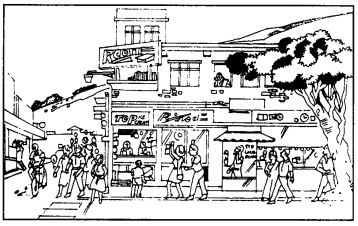
The police interview Chetan to get an eyewitness account of the kidnapping. In pairs conduct the interview. One of you can play the role of Chetan and tell your partner, who plays the role of the police officer, what happened when the kidnapping occurred.
Note: The police officer should ask as many relevant questions as possible to get a detailed account. Write the account in your notebooks.
Answer:
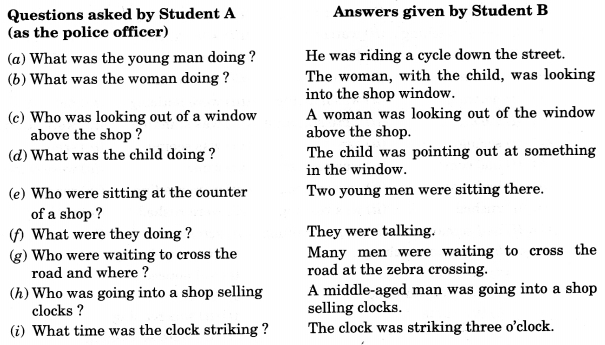
Question 7.
Look at the verbs in the box and put them in the correct columns in the table that follows

| thought | emotion | possession | perception (often used with can) | measurement |
Answer:
| thought | emotion | possession | perception (often used with can) | measurement |
|
regret think suppose |
hate
like wish understand find/consider believe |
own
belong |
smell, taste touch, see remember imagine forget know hear |
weigh measure prefer cost |
Some verbs, like the ones mentioned above, are not normally used in the continuous (- ing) form. However, we do sometimes use such verbs in the continuous form. Look at the following examples.
1. “I can’t concentrate on my work because I’m thinking about that beautiful scene.”
2. “I think it is beautiful.”
- Which sentence expresses an activity in progress at the moment?
- Which sentence expresses a decided opinion?
Answer:
- Sentence 1 expresses this activity.
- Sentence 2 expresses a decided opinion.
Question 8.
The verb ‘to have’
Be careful with the verb ‘to have’, which has many different uses and meanings. Study the box below and consider the sentences that follow.
| Health (H) | Possession (P) | Relationship (R) | |
| Mr Sinha | headache | Maruti car | two daughters |
Put a tick (✓) or cross (✗) against each sentence according to whether it is correct or incorrect.
- Mr Sinha has a severe headache. ___________
- He is having a blue-coloured Maruti car. ___________
- Mr Sinha has two daughters and no sons. ___________
Answers:
- Mr Sinha has a severe headache. ✓
- He is having a blue-coloured Maruti car. ✗
- Mr Sinha has two daughters and no sons. ✓
Question 8.1
Now, work individually, and with the help of the information in the box below, write six appropriate sentences.
| H | P | R | |
| Mrs Sharma | fever | Palatial house | brother-in-law living with them |
| Shyam | Sound health | Personal computer | dog |
Answers:
- Mrs. Sharma has high fever.
- Mrs. Sharma has a palatial house.
- Mrs. Sharma has a brother-in-law living with her family.
- Shyam has sound health.
- Shyam has a personal computer.
- Shyam has a dog.
Question 9.
‘Since’or‘For’
We often use the Present Perfect with time expressions using ‘since’ or ‘for’.
Which expressions go with since and which go with for? (Indicate with a tick). (The first two have been done for you.)
| since | for | |
| last week | ||
| ✓ | a short time | |
| ✓ | a decade | |
| Deepawali | ||
| the day before yesterday | ||
| centuries | ||
| June | ||
| 22nd June | ||
| several weeks | ||
| 2009 | ||
| 6 months | ||
| ages |
We use ‘since’ to express ______ in time, whereas ‘for’ is used to express ______ of time.
Answer:
We use ‘since’ to express a point in time, whereas ‘for’ is used to express a period of time
| since | for | |
| last week | ||
| ✓ | ✓ | a short time |
| ✓ | a decade | |
| ✓ | Deepawali | |
| ✓ | the day before yesterday | |
| ✓ | centuries | |
| ✓ | June | |
| ✓ | 22nd June | |
| ✓ | several weeks | |
| ✓ | 2009 | |
| ✓ | 6 months | |
| ✓ | ages |
Question 10.
Choose three ‘since’ expressions and three ‘for’ expressions from the table above. Then write six sentences using the pattern in the box below.
I haven’t seen him since the day before yesterday.
I have not seen him for ages.
Answers:
(a) We have lived in Chandigarh since 2009.
(b) She has not visited me since Deepavali.
(c) He has not come here since 22nd June.
(d) I have not seen him for several weeks.
(e) I have owned a scooter for a decade now.
(f) This heap of rubbish has not been removed for 6 months.
Question 11.
The news
(a) Narendra Singh – broke record – long jump – regional meet – Principal sent congratulations – also President Youth Federation
(b) Narendra Singh from St. Michael’s School has broken the regional long jump record. The principal of St. Michael’s has sent his congratulations. Best wishes have also come from the President of the Youth Federation.
Work individually, and note down some events that occurred recently in your school or local area in the same way as the example in (a). Write a short report about it in the space given below.
_________________________________________
Exchange notes with your partner. Read out your partner’s information as a news broad¬cast. Use the present perfect tense to report I express actions completed in the recent past but whose effect still remains.
Use your imagination to make the news item sound exciting.
Answer:
A spate of unfortunate events in Madurai — valuables worth Rs. 50,000 stolen — a car snatched at dagger point — a cloth merchant stabbed in broad daylight — the Accountant of the Sugar Mill deprived of cash while coming out of the bank — Some girls teased and molested by some youths — Superintendent of Police assured early arrest of the culprits.
There has been a spate of some unfortunate events in Madurai. The thieves entered a house at night and decamped with valuables worth Rs. 50,000. A cloth merchant has been stabbed in broad daylight over a rupee. The Accountant of the Sugar Mill has been deprived of his briefcase. He was carrying the salary of the staff in it. Some girls have been molested by some youths. The Superintendent of Police has assured early arrest of the culprits.
Question 12.
Present Perfect Continuous
“What have you been doing?”
Imagine what people have been doing or what are the things that have been happening.
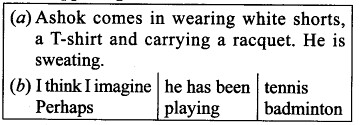
Question 12.1
(а) Mohan comes in wearing overalls and is covered in paint.
(i) _______________________________________
(ii) _______________________________________
(b) Ramesh comes in with a smile on his face. He is holding a trophy.
(i) _______________________________________
(ii) _______________________________________
(c) Monica returns home with lots of packets in her hands.
(i) _______________________________________
(ii) _______________________________________
(b) Sheela comes in with red eyes and a wet handkerchief.
(i) _______________________________________
(ii) _______________________________________
Answers:
(a) (i) Perhaps he has been painting a picture.
(ii) I think he has been painting his house.
(b) (i) I think he has been returning after a prize distribution function.
(ii) Perhaps he has been coming after attending a tournament.
(c) (i) I think she has been shopping.
(ii) I imagine she has been returning from market.
(d) (i) I think she has been crying.
(ii) Perhaps she has been suffering from conjunctivitis (disease of the eyes).
Question 12.2
Now write three situations similar to (a) in the box. Exchange the infor¬mation with your partner and guess the answer to each other’s situations as in (b).
Question 1.
My dog is barking angrily and is trying to get loose.
Answer:
(a) Perhaps someone has been knocking at the door.
(b) I think some passer-by has been throwing stones at it.
Question 2.
The car is making a curious noise.
Answer:
(a) I think it has been running without water.
(b) I think it has been running without mobil-oil.
Question 3.
Satish enters breathing heavily.
Answer:
(a) I imagine he has been suffering from some disease.
(b) I think he has been running fast.
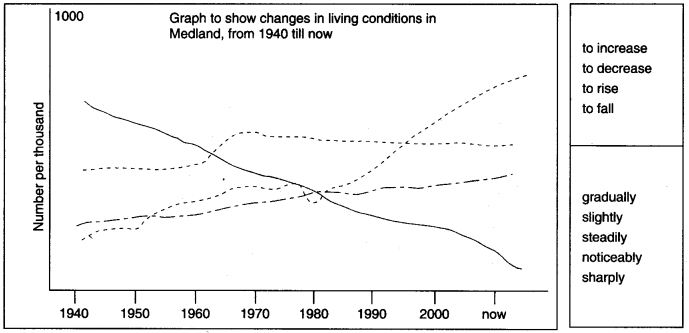
“Living conditions have been improving….”
Key
——- Number of children in secondary school.
——- Number of people dying from malnutrition.
——- Number of homes with running water.
——- Number of women working outside the home.
Write a report on the changes in living conditions in Medland between 1950 and now. Suggest reasons for these changes. Use the present perfect continuous where necessary. You may wish to use the words in the vertical box above right.
(а) Over the years since 1950 the number of children in secondary schools has been increasing noticeably. This is possibly because the Government has been building more schools.
(b) The number of homes with running water has been rising sharply since 1985, whereas
Answer:
Over the years since 1950 the number of children in secondary schools has been increasing noticeably. This is possibly because the Government has been building more schools to provide the education at secondary level. The efforts of the Government in providing health education, a meal a day to the children at schools, sanitary conditions and facilities in hospi¬tals and Primary Health Centres, have borne fruits. The people have become health conscious. That is why, there has been a noticeable fall in the number of children and people dying from malnutrition.
The number of homes with running water has been rising sharply since 1985. A large number of people have been getting clean and pure water. This has sharply decreased the cases of water-borne diseases. The number of women working outside homes has been steadily increasing boosting their husbands’ income and rise in their standard of living.
Question 14.
Used to and Would
Read the passage given below. Substitute ‘used to’ with ‘would’ wherever appropriate so that the passage reads better.
When I was a student, I used to visit the library frequently. The librarian was a kind man and he used to help me select my books. There used to be a small tea shop near the library. After spending a few hours in the reading room of the library, 1 used to go to this tea shop to meet my friends. There used to be an old waiter who kept a corner table reserved for us.
Could you replace ‘used to’ with ‘would’ in every instance?
No. This is because they are used differently.
Read the passage again and complete the sentences below.
1. ‘used to’ is used to describe _______ in the present as well as situations that existed in the past.
2. ‘would’ is used to describe only _______ in the past.
Answers:
- ‘used to ‘is used to describe a habitual action done in the past but not (necessarily) continued in the present.
- ‘would’ is used to describe only a habitual action in the past not necessarily discontinued afterwards.
Think of the days when you were eight years old. Write down four or five things you would do or used to do or be. Make sentences like those in the box. Share your experiences with your partner.
Answer:
When
I
was eight years old,
I
used to play with toys. My grandfather would give me these toys. My younger brother, who was four years old, used to break the toys.
I
would complain to my grandfather about him. My parents used to encourage me for devoting more time to study.
Question 18.
Reviewing Verb Forms
Question 18.1
Edit the following letter by choosing the appropriate word for each underlined word from the given options:
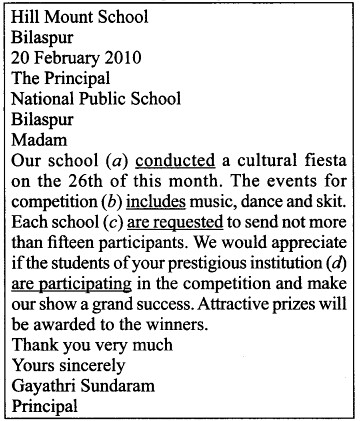
(a)
- is being conducted
- is conducting
- are conducting
- conducts
(b) (i) is included
(ii) are included
(iii) is being included
(iv) include
(c) (i) requested
(ii) is requested
(iii) are requested
(iv) request
(d) (i) participated
(ii) participate
(iii) is participated
(iii) participating
Answers:
(a) 2 is conducting
(b) 4 include
(c) 2 is requested
(d) 2 participate
Question 18.2:
Complete the following news item by choosing the correct word from the options given below.
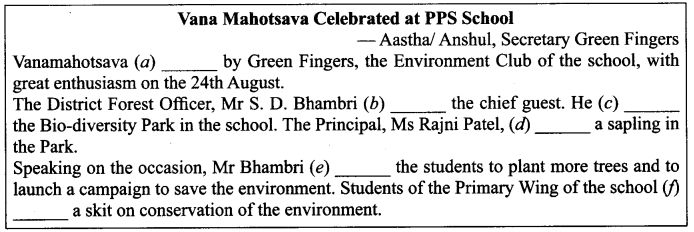
(a) (i) has celebrated
(ii) was celebrating
(iii) celebrated
(iv) was celebrated
(b) (i) were
(ii) was
(iii) was being
(iv) has been
(c) (i) was inaugurating
(ii) had inaugurated
(iii) inaugurated
(iv) inaugurating
(d) (i) had been planting
(ii) planted
(iii) were planting
(iv) had planted
(e) (i) had urged
(ii) had been urging
(iii) urged
(iv) urging
(f) (i) presented
(ii) was presented
(iii) were presenting
(iv) had presented
Answers:
(a) 4 was celebrated
(b) 3 was
(c) 3 inaugurated
(d) 2 planted
(e) 3 urged
(f) 2 presented
We hope the NCERT English Workbook Class 9 Solutions Unit 1 Verb Forms help you. If you have any query regarding CBSE Class 9 English Workbook Solutions Unit 1 Verb Forms, drop a comment below and we will get back to you at the earliest.